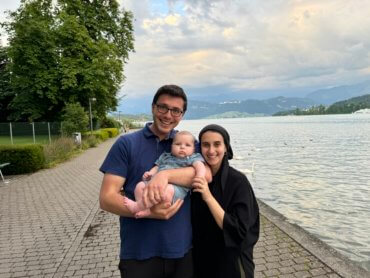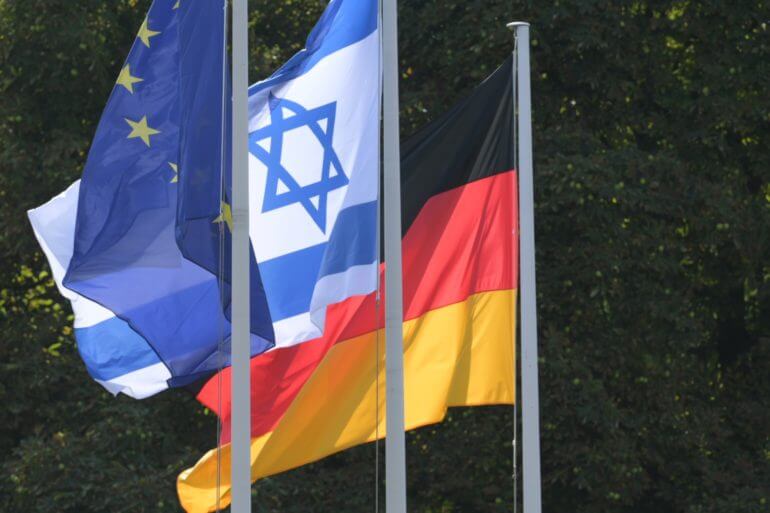
Germany Has Become One of Our Unexpected Allies — Is this the Next Go-To Travel Destination?
In the midst of rising anti-Semitism, raging protests and increased all-around Jew hatred worldwide, Germany has come out in full support of the Jews and Israel.
In November, Berlin outlawed the slogan “From the river to the sea, Palestine will be free.” It was criminalized, declaring it a form of incitement to hate. The slogan, “Death to the Jews” is currently banned as well. The penalty for using one of these slogans can be a fine or even a prison sentence.
On October 12, after the horrific attack against Israel, Federal Chancellor Scholz lit up the Brandenburg Gate with an Israeli flag, the location where Nazi flags hung in the 1940s. In his official statement, he said, “There is only one place for Germany: alongside Israel.”
While there are still pro-Palestinian protests in Germany — as recently as this past Saturday at a performance — the country seems to be standing by Israel and the Jews. The German culture minister Claudia Roth condemned the recent protest saying, “Hate, anti-Semitism, racism and such forms of violence are absolutely unacceptable and have no place in the space of art or anywhere else.”
While Europe feels scary to Jews right now — a Jewish man was just stabbed six times in an anti-Semitic attack in Paris yesterday — Germany could be emerging oddly, as one of the better places to go.
Matti Geyer is a private tour guide in Berlin who specializes in Jewish tours. Although he isn’t Jewish, he and his family have been friends to the Jews for years now. Here, Matti put together his insights and tips on how to make a trip to Berlin accommodating, interesting thought-provoking and comfortable.

Key Sights and Landmarks include:
- The New Synagogue: Built in the mid-19th century, this stunning structure is a testament to the vibrant Jewish community that once thrived in the city. Designed by renowned architect Eduard Knoblauch in Moorish style, the New Synagogue boasts intricate domes, ornate arches, and majestic towers that capture the eye and inspire awe. Its grandeur reflects the cultural and religious significance of the Jewish community in Berlin during the 19th century. During the infamous Kristallnacht pogrom of November 1938, the New Synagogue miraculously survived the wave of destruction that swept across Jewish institutions in Germany. While other synagogues were reduced to rubble, the New Synagogue was saved by a local policeman who forced the SA out and allowed fire brigades in to turn off the flames.
- Synagoge Rykestraße: Constructed in the late 19th century, the Synagogue Rykestraße is the largest synagogue in Germany. It survived the Nazis as it stood too close to residential buildings for them to burn it down.
- Jewish Cemeteries (Weissensee and Schönhauser Allee): The Weissensee and Schönhauser Allee Jewish Cemeteries are among the largest and most significant Jewish burial grounds in Europe. They are stunningly beautiful!
- Old Jewish Schools: The old Jewish boys’ and girls’ schools in Berlin were integral to the Jewish community’s commitment to education and cultural preservation.
- Bavarian Quarter: The Bavarian Quarter, located in the Wilmersdorf district of Berlin, was once a vibrant center of Jewish life and culture. Home to a large Jewish population in the early 20th century, it boasted synagogues, schools, and communal institutions. Notable residents included renowned physicist Albert Einstein, who lived in the area during the 1920s. Memorial signs have been installed to remind people of the racist Nuremberg laws.
- Jewish Museum: The Jewish Museum in Berlin is a world-renowned institution dedicated to preserving and celebrating Jewish history, art, and culture. Designed by architect Daniel Libeskind, the museum’s iconic structure symbolizes the fragmented and tumultuous history of the Jewish people in Germany.
- Liebermann Villa: The Liebermann Villa, located on the shore of Lake Wannsee, was the former residence of Max Liebermann, one of Germany’s most prominent Jewish artists. Liebermann played a significant role in the Berlin art scene during the late 19th and early 20th centuries, advocating for modernism and artistic freedom. Today, the villa serves as a museum dedicated to Liebermann’s life and work, showcasing his impressive collection of paintings and sculptures.
- Otto Weidt Workshop for the Blind: The Otto Weidt Workshop for the Blind, situated next to the Hackesche Höfe courtyard complex, is a poignant reminder of one man’s courageous efforts to protect Jewish employees during the Holocaust. Otto Weidt, a German factory owner who was partially blind himself, employed blind and deaf Jews in his workshop, providing them with a safe haven amidst the persecution of the Nazi regime. The workshop now operates as a museum, preserving the memory of Weidt’s humanitarian actions and honoring the victims of Nazi atrocities.
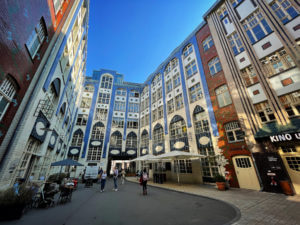
- Hackescher Markt: The Hackescher Markt area, located in Berlin’s Mitte district, was once a bustling hub of Jewish life and commerce. Home to a vibrant Jewish community in the late 19th and early 20th centuries, it was characterized by its lively markets, synagogues, and cultural institutions. While much of the area was destroyed during World War II, the Hackescher Markt neighborhood has undergone significant revitalization in recent years, attracting visitors with its eclectic mix of cafes, galleries, and boutiques.
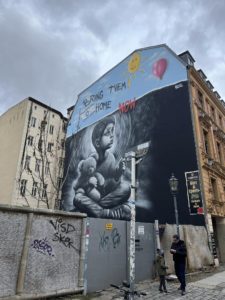
- Humboldt University and Book Burning Memorial: Humboldt University, one of Germany’s most prestigious universities, has a complex history intertwined with the rise of Nazism. In May 1933, the university’s central plaza was the site of the infamous Nazi book burning ceremony, where thousands of books deemed “un-German” were publicly incinerated. The Book Burning Memorial, located on Bebelplatz square, commemorates this dark chapter in history and serves as a stark reminder of the dangers of censorship and totalitarianism.
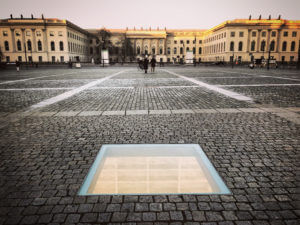
- KaDeWe: The Kaufhaus des Westens, commonly known as KaDeWe, is Berlin’s most famous department store and a testament to the city’s vibrant commercial life. Founded by Jewish entrepreneur Adolf Jandorf in 1907, KaDeWe quickly became a symbol of luxury and sophistication, attracting shoppers from near and far.
Holocaust Memorials
Among the countless memorials scattered throughout the cityscape, those dedicated to the victims of the Holocaust hold a special place in the hearts of Berliners and visitors alike.
One of the most poignant reminders of Berlin’s Jewish history are the Stolpersteine, or “stumbling stones,” embedded in the sidewalks outside the former residences of Holocaust victims. Created by artist Gunter Demnig, these small brass plaques bear the names and life dates of individuals who perished in the Holocaust. Each Stolperstein serves as a humble yet powerful tribute to a life lost and a community shattered.
Every year on November 9th, the anniversary of Kristallnacht, locals (Jewish and Non-Jewish alike) gather to clean the Stolpersteine and light candles next to them. This solemn ritual is a reminder of Berliners’ commitment to remembering the past and honoring the memory of those who were persecuted during the Holocaust. It is a testament to the enduring impact of history on the present and the collective responsibility to ensure that the atrocities of the past are never forgotten.
- Memorial to Murdered Jews of Europe: Perhaps the most iconic Holocaust memorial in Berlin is the Memorial to the Murdered Jews of Europe. Designed by architect Peter Eisenman, this striking memorial consists of 2,711 concrete slabs arranged in a grid pattern on a sloping field. Visitors are invited to walk among the towering slabs, experiencing a sense of disorientation and contemplation as they navigate the maze-like structure. A small museum can be visited underneith the Memorial.
- Platform 17 Memorial: Located at the Grunewald train station, Platform 17 Memorial commemorates the thousands of Jews who were deported from Berlin to concentration camps during the Holocaust. The memorial consists of steel plates inscribed with the names of the deportees and the dates of their transport. Visitors can reflect on the tragic history of the deportations and pay their respects to the victims.
- Deportation Memorial Große Hamburger Straße: This memorial marks the former site of a collection point where Jewish citizens were rounded up before being deported to concentration camps. It stands in front of Berlin’s oldest Jewish cemetery, which got destroyed by the Nazis.
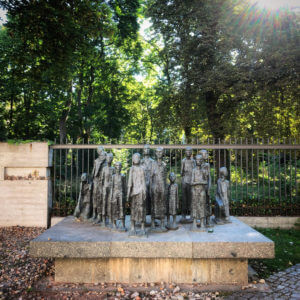
- House of the Wannsee Conference: The House of the Wannsee Conference, located in the tranquil suburb of Wannsee, is where senior Nazi officials met in January 1942 to coordinate the Final Solution—the systematic genocide of European Jews. Today, the house serves as a memorial and education center, providing insight into the planning and implementation of the Holocaust.
Throughout Berlin, there are also countless other smaller memorials marking the sites where synagogues, Jewish schools, and other communal institutions once stood. These understated yet powerful memorials serve as reminders of the vibrant Jewish communities that existed in Berlin before the Holocaust and the devastation wrought by Nazi persecution.
Exploring Kosher Cuisine in Berlin
Hummus & Friends
Nestled in the heart of Mitte, Hummus & Friends beckons with its tantalizing array of kosher-certified delights. Owned by a dynamic partnership—one Jewish and the other not—the restaurant offers a fusion of flavors, blending traditional recipes with modern flair. While open on Shabbat, the kosher certification ensures authenticity and adherence to dietary laws, making it a favored destination for both locals and visitors alike.
Bobbe Speisesalon
In the vibrant borough of Schöneberg, Bobbe Speisesalon stands as a testament to the eclectic blend of Israeli-oriental cuisine. Amidst a trendy atmosphere, guests are treated to a feast for the senses, with a menu brimming with fleischig delights. From savory meats to aromatic spices, each dish reflects the culinary heritage of Israel, offering a tantalizing glimpse into its vibrant gastronomic landscape.
Bleiberg’s
Discover the culinary delights of Bleiberg’s, nestled in the charming neighborhood of Wilmersdorf. Under new ownership, this dairy restaurant boasts a tantalizing variety of Israeli cuisine, curated to delight the palate and nourish the soul. From delectable appetizers to indulgent desserts, each dish is crafted with care and precision, promising a dining experience unlike any other.
Ivgi’s Kosher Restaurant
Immerse yourself in the flavors of Sephardic cuisine at Ivgi’s Kosher Restaurant in Schöneberg. With its authentic dishes and warm ambiance, this eatery invites guests to savor the essence of traditional flavors. From hearty stews to succulent grilled meats, each dish is a testament to the rich culinary heritage of the Sephardic community, offering a taste of history with every bite.
Beth Cafe
Nestled within the bustling streets of Mitte, Beth Cafe offers a serene oasis for those seeking a taste of dairy delicacies. Situated within the Adass Yisroel community building, this humble cafe doubles as a cozy spot to enjoy a light meal and a convenient spot to purchase kosher groceries. With its simple yet satisfying menu, Beth Cafe is a cherished destination for those craving comfort food in a welcoming setting.
How Orthodox Jews can observe Shabat in Berlin
There are four Orthodosx synagogues:
Chabad-Lubavitch West
Located in the heart of Wilmersdorf, Chabad-Lubavitch West welcomes worshippers to experience Orthodox-Chassidic traditions in a vibrant setting. With services held depending on sunset on Friday evening and Saturday morning at 10 am, this synagogue provides a warm and inclusive atmosphere for spiritual growth. Open on weekdays, visitors can immerse themselves in prayer and contemplation within its hallowed walls.
Chabad-Lubavitch East
Nestled in Mitte, Chabad-Lubavitch East embodies the essence of Orthodox-Chassidic spirituality. With services held on Friday evening at 6.30 pm in winter and 7.30 pm in summer, and Saturday morning at 10.30 am, worshippers can partake in the sacred rituals of Shabbat. Additionally, Shabbat meals for tourists are offered each Friday night after the service, providing a communal gathering to share in the blessings of the Sabbath.
“Joachimstaler” Synagogue
Located in Charlottenburg, the “Joachimstaler” Synagogue is a beacon of Ashkenazi-Orthodox tradition. With services held on Friday evening at varying times based on sunset during winter and consistently at 7:30 pm during summer, and Saturday morning at 9:30 am, worshippers can engage in prayer and reflection within its historic walls. Open on weekdays, the synagogue offers a sanctuary for spiritual seekers seeking solace and connection.
Adass Yisroel Synagogue
Situated in the heart of Mitte, Adass Yisroel Synagogue exudes Orthodox-Litvakish spirituality. With services held on Friday evening at varying times during winter and between 6 and 7 pm during summer, and Saturday morning at 9:30 am, worshippers can immerse themselves in the sacred rhythms of Shabbat. Open on weekdays, entrance is granted upon registration in advance, offering a serene space for spiritual seekers to connect with their faith.
A number of Chabad Houses throughout the city also host Shabbat meals.
Orthodox-Friendly Accommodation in Berlin: Crowne Plaza Berlin City Centre
Nestled in the heart of Berlin, the Crowne Plaza offers a comfortable retreat for Orthodox Jewish travelers. With specialized amenities including a fresh Kosher Breakfast supervised by Rav Ehrenberg, Berlin, and options for kosher packed meals, guests can enjoy a convenient and fulfilling stay. Located within walking distance of prominent synagogues such as the Sephardic Synagogue Tiferet Israel Berlin and the “Joachimsthaler” Orthodox Synagogue, the hotel provides easy access to spiritual nourishment amidst the vibrant cityscape of Berlin.
Here, more about Matti:
Meet Matti, a private tour guide in Berlin, Germany. Specializing in Jewish Berlin tours, he has led countless visitors on immersive journeys through the heart of this vibrant city. While he may not be Jewish himself, his deep connection to Berlin’s Jewish culture runs in his family. Growing up in East Germany, his parents navigated a complex landscape of cultural change after the fall of the Berlin Wall. As his mother became proficient in Russian during communism, she found herself uniquely positioned to support Berlin’s Jewish community, which was in need of Russian translators to assist the influx of Jewish immigrants from former Soviet countries post 1989. She eventually rose to become the Personal Assistant to the head of Berlin’s Jewish community. Join Matti as he unveils the untold stories of Jewish Berlin, offering a unique perspective shaped by personal experience and historical insight. You can learn more about Matti and get in touch at toursofberlin.com.
If you found this content meaningful and want to help further our mission through our Keter, Makom, and Tikun branches, please consider becoming a Change Maker today.




